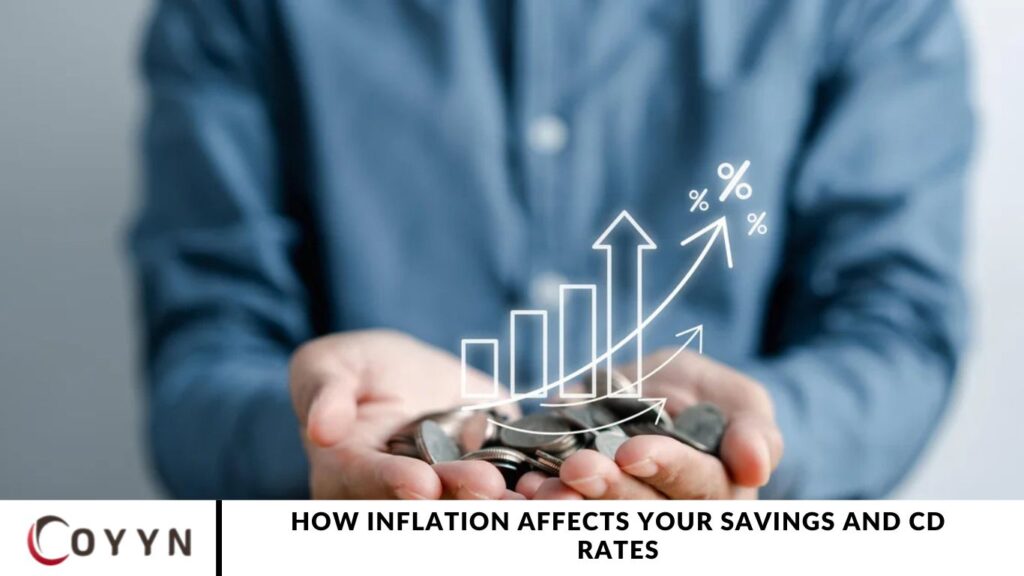When inflation slows, everyday expenses like groceries, gas, and borrowing costs tend to ease. In some cases, prices can even drop significantly, giving your wallet a much-needed break.
However, falling inflation has a downside: it often leads to lower interest rates on savings accounts and certificates of deposit (CDs).
Earlier this year, economists predicted a decline in both inflation and interest rates, which offered positive news for borrowers but presented challenges for savers looking to grow their money. Yet, recent developments—including new tariffs, widespread federal layoffs, and large-scale worker deportations—have introduced heightened economic uncertainty.
Due to these unpredictable factors, the Federal Reserve, which sets key interest rates, is unlikely to make any immediate changes. As a result, savings account rates and CD yields are expected to remain relatively stable, with little movement either upward or downward in the coming months.
Table of Contents
How are inflation and interest rates related?
Inflation and interest rates share a strong connection — when inflation rises, interest rates typically climb as well. Conversely, when inflation declines, interest rates tend to drop.
Take 2021 as an example: the average interest rate for a 30-year mortgage was just 2.96%. However, after inflation surged to an average of 7.1% in 2022, mortgage rates rose sharply to 5.34%. During the same period, the national average rate for 12-month certificates of deposit (CDs) increased from 0.13% to 1.07%.
As these numbers show, borrowing money becomes more expensive when inflation spikes. On the upside, higher inflation can also mean your savings balances grow faster due to increased interest rates. Some of the financial accounts that often see rate increases when inflation rises include:
- Checking accounts
- Savings accounts
- Money market accounts (MMAs)
- Certificates of deposit (CDs)
- Treasury bills
Does inflation impact savings accounts and CD rates?
Inflation plays a significant role in shaping savings and certificate of deposit (CD) rates. When inflation swings too high or too low, you’ll often notice shifts in the interest rates on your bank accounts within a few months. Here’s a simple breakdown of how the process typically unfolds:
- Prices Rise: Everyday essentials like groceries, utilities, and vehicles become more expensive.
- The Federal Reserve Takes Action: To combat rising inflation, the Fed raises the federal funds rate — a key tool used to cool economic activity and steer inflation back toward its 2% target.
- Banks Respond: Financial institutions adjust by increasing interest rates on loans and deposit accounts, including savings accounts and CDs.
However, it’s important to note that inflation isn’t the only factor influencing deposit rates. Banks may also raise interest rates independently to attract new customers and boost deposits, regardless of inflation trends.
Here’s the downside: savings account interest rates are flexible, moving up or down with the market. CD rates, on the other hand, are locked in for the entire term. While you might snag a higher CD rate when inflation is high, you risk losing purchasing power if inflation — and rates — keep rising while your money is tied up. In that case, you’ll either have to wait until the CD matures to reinvest at a better rate or pay a penalty to break the CD early.
How to maximize your savings return when inflation is going up or down.
No matter how inflation is trending, there are always strategies to help you earn more interest on your money. Here are a few innovative ways to boost your savings:

Shop around
Whether interest rates are up or down, comparing bank offers can help you earn more on your savings. For instance, while the national average savings account rate sits at just 0.41%, some of the top high-yield savings accounts are offering rates above 4%.
Read the fine print.
Be sure to carefully review the terms and conditions of your bank accounts. Knowing the fine print can help you avoid costly fees, like monthly maintenance charges that often apply when your balance falls below a required minimum. These fees can quickly erase any interest you earn.
If the account offers tiered interest rates — where higher balances earn better rates — double-check that you can comfortably maintain the balance needed to qualify for the top tier.
Be bright with fixed rates.
Fixed-rate accounts like CDs and Treasury bills call for a little extra planning. If interest rates are high — or expected to fall soon — it’s wise to lock in a high rate for as long as you can. On the other hand, if rates are likely to rise, choosing a shorter-term fixed-rate account gives you the flexibility to take advantage of better rates later on.
Consider taxes
When deciding between savings accounts, CDs, or T-bills, interest rates aren’t the only factor to consider. It’s also important to consider each account’s tax implications.
Interest earned from savings accounts and CDs is subject to both federal and state taxes. However, with Treasury bills (T-bills), you’re only required to pay federal taxes, as they are exempt from state taxes.
Is Putting Money in a CD Worth It?
With CDs, there’s always the risk that returns won’t outpace inflation. However, one significant benefit of bank CDs is the security they offer. Unlike other investments, CDs are insured by the Federal Deposit Insurance Corp. (FDIC), providing a level of protection you won’t find elsewhere.
Frequently Asked Question
How does inflation impact savings account interest rates?
Inflation often leads to higher interest rates on savings accounts, as banks raise rates to keep up with the increased cost of living and to encourage deposits. However, if inflation decreases, savings account rates tend to drop as well.
Does inflation affect CD rates?
Yes, inflation plays a significant role in determining CD rates. When inflation rises, banks typically offer higher CD rates to help customers maintain purchasing power. Conversely, lower inflation often results in lower CD rates.
Can inflation erode my savings in a CD?
Yes, if inflation rises faster than the fixed interest rate on your CD, the purchasing power of your savings may decline over time. This is especially true for long-term CDs with lower rates.
Should I lock in a fixed-rate CD during high inflation?
If inflation is high or expected to fall soon, locking in a fixed-rate CD at a higher rate can help protect your savings. However, if rates are likely to rise further, consider a shorter-term CD to take advantage of higher rates later.
How do rising inflation and interest rates affect borrowers?
When inflation rises, the Federal Reserve typically increases interest rates to control inflation. This can make borrowing more expensive, as higher interest rates lead to higher loan and credit card rates.
Are there any types of accounts that protect against inflation?
Certain accounts, like Treasury Inflation-Protected Securities (TIPS) or high-yield savings accounts, are designed to offer some protection against inflation. TIPS, for example, adjusts with inflation, ensuring that your investment maintains its purchasing power.
Will my savings account earn more interest during inflation?
During periods of inflation, interest rates on savings accounts may rise to help banks attract deposits. However, the rate may still be lower than the inflation rate, meaning your savings may lose purchasing power despite earning interest.
Conclusion
Inflation plays a crucial role in shaping the returns on your savings and CDs. As inflation rises, interest rates on savings accounts and CDs often follow suit, offering higher returns to help offset the increased cost of living. However, inflation can also pose a risk to the purchasing power of your savings, mainly if your investments aren’t keeping up with rising prices.
While CDs offer stability and security, primarily through FDIC insurance, they may not always provide returns that outpace inflation, especially in periods of high or fluctuating inflation. It’s important to carefully evaluate your financial goals and time horizon when choosing between savings accounts, CDs, and other investment options.


